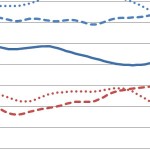Amazon: Failure to Lure or RI Out of the Question?
The decision of online retailer Amazon.com to build a warehouse in Fall River has been quite the talk around Rhode Island. To read John Kostrzewa in the Providence Journal, one would conclude that Rhode Island just didn’t dive into the bidding war for the company’s presence:
But Amazon never seriously considered Rhode Island because former Gov. Lincoln Chafee, who also chaired the Rhode Island Economic Development Corporation, made clear he was not in favor of extending large tax breaks to attract big businesses.
As a disclaimer, I’d take that with a grain of salt. The source appears to be an economic development executive in the Fall River government, who would have incentive to emphasize the importance of cutting a deal with the company. Additionally, with the agreement just announced, it seems like the company would have understood that Chafee was on his way out. In other words, the decision not to consider Rhode Island seriously may have been prior to Chafee intransigence.
Other factors outside of Rhode Island’s control may have been a factor, as well. It depends what areas Amazon wanted to cover with the facility. Rhode Island would have had an edge if Connecticut and points west were in the mix, but Fall River’s a shorter jaunt down the highway from Boston and the Cape. Moreover, the chosen location isn’t far from 495, so the ability to avoid a metropolitan area in transit may have played a role.
My bet, however, is that the biggest factor in Amazon’s decision was simply Rhode Island’s way of doing business. Indeed, a few years ago, we made that company a poster child. Remember this 2009 article, from a little known Providence Business News journalist named Ted Nesi?
Amazon.com Inc. cut ties today with its business affiliates in Rhode Island to protest a provision in the draft state budget that would force the company to collect sales tax, Providence Business News has confirmed. …
The fight between Amazon and the state stems from a 1967 U.S. Supreme Court decision, reaffirmed in 1992, that said businesses without a physical presence in a state are not required to collect that state’s sales tax. The court ruled that forcing firms to navigate the nation’s many state and local tax regimes would pose an unconstitutional barrier to interstate commerce.
At the time, the General Assembly had just passed legislation to make online affiliate programs count as a presence in the state to trigger the requirement to collect sales tax. I noted at the time that Rhode Island is innovative at finding ways to squeeze money out of people and harm those trying to scrounge together a living.
The subject came up again in 2012, when a “Reinvent Rhode Island” series in the Providence Journal emphasized the importance of having distribution centers in the state. I wasn’t able to determine whether a distribution center would trigger the sales tax, but that would be a huge risk for an online giant like Amazon to take.
Being a central economic power in New England, Massachusetts isn’t a state that Amazon can avoid, so the state is already on the list of those for which the company must collect sales taxes. In contrast, either this distribution center would have added Rhode Island to the list, or the company could have easily predicted that the General Assembly would change the law to include distribution centers as “a physical presence” for the purposes of sales taxes.
I’m sure limited and targeted tax incentives come into consideration for companies deciding where to put locations, but before a state can even get there, it has to be a place that the companies would like to be. Rhode Island does everything it can to undermine its natural advantages in that area.


